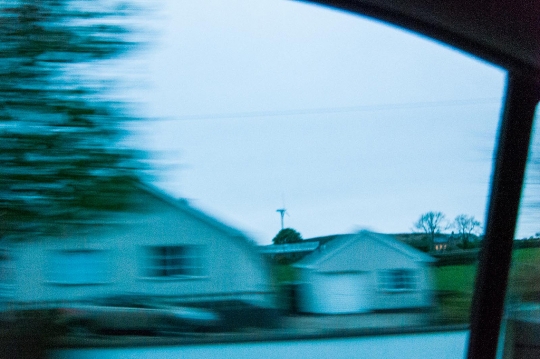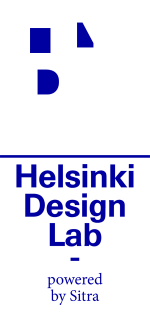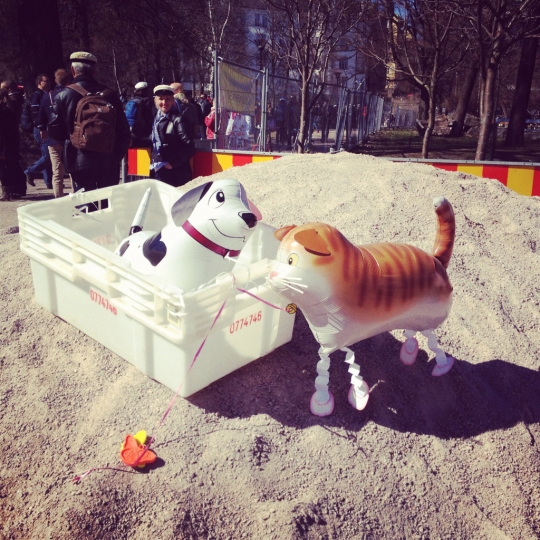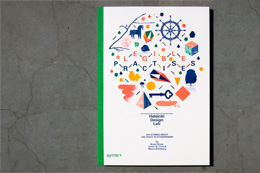OK, latenote for last week. The highlight was perhaps a great conversation with various representatives of Canada's Social Innovation Generation partnership (SIG), who were in the neighbourhood (well, Stockholm) and were kind enough to swing by Helsinki for a chat.
They're doing really interesting work scoping out what they call the "change lab" model, preparing the ground in Canada. We were visited by Cheryl Rose (Associate Director of Waterloo Institute for Social Resilence and Director, Program Development for SIG), Tim Brodhead, (JW McConnel Family Foundation, SIG, MaRS Discovery District), and Sam Laban (Education Program Manager, SIG). We have lots of visitors to Sitra and HDL, and always enjoy and learn from the discussions and connections, but rarely has a group been so well-prepared and asked such perceptive and insightful questions.
I'm intrigued by Canada, having never been but idly marking it as a kind of mirror/inverse of Australia (vast, sparsely-populated, resource-rich, echoes of empire, Anglo in bits, fine cities, incredible landscape, great cities etc. etc.—and it is of course completely different, I'm sure). And we've been delighted to see the thinking emerging there—as noted previously, their summary of lab-like iniatives ("Labs: Designing the Future") is definitely worth a read—and so we're really pleased to open up this diaglogue. It looks like I'll be visiting Canada in return, this November, which I'll update you about nearer the time. Thanks to Cheryl, Tim and Sam for popping in.
Bryan had to rush off after lunch with the Canadians, heading over to Derry. After noting the preponderance of wind turbines in the Irish countryside ...

Turbines in the Irish countryside.
... he took part in the Academy of Urbanism's Annual Congress on The Resilient City, and he reports that It Was Good. The level of conversation was excellent, and the very particular context of Northern Ireland perhaps lent the affair a seriousness and motivation that is often lacking in similar events.
Bryan pointed me at one project—a comprehensive regeneration plan for Derry-Londonderry [read the full PDF or summary PDF]. It looks to have a good strategic edge, which foregrounds what I'd call the real drivers of cities (economy, culture, community) but views them holistically alongside some necessary strategic interventions (improving health, approaching sustainability) and then draws in secondary or tertiary matters like infrastruture, buildings and so on. Have a squint at the diagrams on page 7 and 8 of the shorter PDF:
Meanwhile, lots of work on Brickstarter. I've started designing the first 'alpha' version of the web service, which we'll share some details of shortly. As ever, we're using the website as a kind of token in order to open up wider, systemic issues—but you have to build the thing in order to flush them out. So it's been very interesting, and very rewarding, to finally be discussing the details of the various interactions we want to explore i.e. crowdfunding versus voting? What do we mean by voting? How do we balance a democratic model alongside crowdfunding? How explicit do we make the council? How to do a slow reveal on the dark matter so as to enable a low barrier to entry yet subtly unpack it over time such that the project proposals are robust enough to be taken seriously? All this and more emerging over at brickstarter.org shortly.
I love getting to this stage of a project, as everything starts to come together. With a project straddling governance and democratic models, crowdfunding and emergent community actions, sustainable development across use of shared space, shared resources, energy and so on, it actually helps crystallise the project considerably. Then our job is to draw out the shifts in this otherwise imperceptible dark matter implied by such a product or service, such that we might enable their productive reshaping. (I also happen to love spending hours in Photoshop and Illustrator, frankly. For the strategic designer, the challenge is always to balance the lure of exercising your craft skills with the requirements of the strategic, systemic view. But one enables a better view of the other, and vice versa.)
We finally got our first Finnish post up there (thanks to Kali!) and there's a good overview of crowdfunding platforms by Bryan, too.
Kalle's been doing some nice background research on 'food profiles' for other cities, for Helsinki Street Eats. We'll have a set of cards emerging for different cities shortly, to enable productive comparison with Sydney, looking at the regulations, governance culture, scene on the streets, and so on. We're also now in discussions about how and what we can fund in this area—more on that shortly.
I've also been helping out with the organisation's imminent reorganisation in our building. With Bryan, we've been leading a renovation of one of the floors, but again, really we're looking at the organisation's culture, the way we work, and interract, and so on. (Again, the balance of crafting a specific output with the wider strategic, cultural view.) We have a 'bootcamp' with the management team next week to draw up the first sketch of a new organisation.
And two good lunches. First, Bryan and I with Artek's Ville Kokkonen (design director) and Anna Vartiainen (marketing director). Artek are one of the genuinely great Finnish brands and operations, founded by Aino and Alvar Aalto (a bit of background). Their 2nd Cycle concept is a particular favourite in the Sitra office, indicating a form of "resilence" in which the firm buys back its own products and re-sells them, a simple concept that gracefully indicates the ongoing value of good design and production, as opposed to "throwawayism".
Secondly, I had a good catch-up with Tommi Laitio of the powerhouse that is Demos Helsinki, covering many topics: Baana, Brickstarter and beyond. In particular, we discussed the forthcoming event that Demos are curating at the World Design Capital pavilion (or "paviljonki" as it's known here), where we've invited Marcus Westbury of Renew Newcastle/Renew Australia fame to speak, on an afternoon/early evening session about urban development dubbed "City 2.0" (read a previous conversation with Marcus here.) More info on Facebook, and if you're in town, do come on down. (By the way, a tilt-shift time-lapse of the WDC Pavilion going up. It's designed at Aalto University's Wood Program.)
Oh, and it's the Helsinki-originated increasingly global sensation that is Ravntolapäivä (Restaurant Day) this weekend (May 19th) (for background, read our "Helsinki Street Eats" book-let). Make sure you visit Kalle's coffee stall—"Gaffebaari"—in particular!
Finally, some quick linkage: Brickstarter was mentioned in another scene-surveying post about crowdfunding urban development, this time at ArchDaily; John Thackara asks whether we need an Arne Jacobsen of urban food systems, and "Making Planning Popular: A Manifesto" (related to "Sub-Plan".)
And a little more controversially, an interesting take-down of the open data and transparency movements and a reaction to the perceived over-spending on buildings and infrastructure in Valencia, Spain, homing in on Santiaga Calatrava. Sadly, there's little public controvery here about the proposed (or is it?) road tunnel under central Helsinki, which is apparently still sitting on the city's plans somewhere, and has been for years—or is at least alive in the minds of the current generation of city planners. Not only is this a ridiculously outdated idea ("sell by" circa 1970) it is apparently preventing or otherwise hindering other projects from happening. The local media is asleep at the wheel on such matters, as far as we can tell. More here if/when we get it.
Oh, and I forgot to report: Vappu, a couple of weeks back, was a blast. Very special indeed, and no way near as bacchanalian as I had been led to believe (caveat: I went to bed early.)




